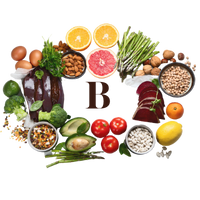Every mother knows that whatever she puts into her body will also go to her baby. It’s led many expectant mothers to give up foods and beverages they loved–or even eat things they otherwise wouldn’t. It’s understandable, then, that they would have questions about their supplement use.
With Nootropic sales on the rise, and millions more people looking into trying them, I decided to help clarify what Nootropics are safe during pregnancy. But as with all our information articles, I will note that you should always consult your physician before beginning a supplement routine, especially while pregnant.
What You Need to Know:
General Supplement Guidelines
A recent medical review was undertaken to address the dearth of information on supplement use by pregnant women. This review exhaustively combed the literature on safety information for ingredients generally found in supplements. Here’s what they found.
B Vitamins
Commonly found in a variety of supplements, and especially Nootropics, there is some concern about B Vitamin toxicity. The following are the upper bounds considered safe for each B Vitamin for pregnant women:
- B6 – 25 mg
- B9 (Folic Acid) – 1 mg, or 1,000 μg (micrograms)
- B12 – 35 μg (or 0.035 mg)

Toxicity and Safety levels for other B Vitamins weren’t explored by this study. We’ll take a look at some of them a bit later. Also, these numbers can get tricky, and it’s important to note that micrograms (μg or mcg) are much smaller than milligrams (mg). All of the top-rated Nootropics we’ve reviewed are around a tenth of these limits, meaning their Vitamin B levels are safe for pregnant women.
Choline
The trigger that fires every neuron in our brains, Choline is a mainstay of Nootropic formulas, and it’s actually prescribed for some expectant mothers. It’s clinical dose is 4,000 mg. In most Nootropics the dose is a fraction of that, usually around 200-300 mg.
Other Vitamins/Minerals
While the following are not typically found in Nootropics, if you see one on a supplement label, here are the safe doses for pregnant women, according to the above study. In the next section we’ll take a look at other Nootropic ingredients.
Supplement Ingredient | Safe Upper Limit |
|---|---|
Vitamin A | 3 mg |
Vitamin C | 2,000 mg |
Vitamin D | 100 mcg |
Vitamin E | 1,000 mg |
Calcium | 2,500 mg |
Iodine | 1,100 mcg |
Iron | 45 mg |
Magnesium | 350 mg |
Zinc | 40 mg |
Omega-3 | 2.7 mg |
Other Nootropic Ingredients
I’ve taken an extensive look at each ingredient in the very best Nootropics on the market, using them as a barometer of the safest options. By taking each ingredient in turn, I’ve compiled a list of Ingredients a pregnant person should avoid, and ones that are possibly beneficial. Each woman should consult their Obstetrician for clarification in their given case.
Ingredients to Avoid!
Bacopa Monnieri
Unfortunately, the mainstay of Nootropics is not safe during pregnancy. In animals studies, it has been researched to prevent cognitive decline in mothers–but the safety wasn’t established. More research is needed.

A big red flag was raised in a study showing that Tyrosine intake altered the Dopamine Neurons of offspring. Stay away.
L-Theanine
Theanine should be avoided by pregnant women for the same reason it’s so effective in Nootropics–it can lower the heart rate. During gestation, this can have adverse effects on the fetus.
Cat’s Claw
During pregnancy, the mother’s immune system is compromised. Because Cat’s Claw has caused problems in other immuno-compromised populations, pregnant women should steer clear.

Huperzine A and Lion’s Mane
According to multiple sources, there simply isn’t enough data to recommend one way or the other on pregnant women taking these medicinal mushrooms. And with childbearing, no evidence translates as “avoid it.”
*Resveratrol
A natural antioxidant, it’s generally regarded as safe. The asterisk here is that the most comprehensive study to date mentions both beneficial and harmful effects of Resveratrol on pregnant women and offspring.
Caffeine
The current literature allows for pregnant women to consume up to 200 mg of caffeine per day, which is far less than found in many Nootropics. But if you’re taking caffeine from any other source, such as tea or coffee, then Caffeine supplements should be avoided.

Theobromine
A major chemical component of chocolate, sadly, it should be avoided. Excess Theobromine can actually impede fetus growth.
Rhodiola Rosea
Even ardent supporters of Rhodiola (such as Mental Health America) recommend steering clear if pregnant, mostly due to a lack of data.

Vitamin B1 (Thiamine)
How can Vitamins be bad for you? Well, this goes back to the toxicity issue. The National Health Service (UK) recommends pregnant women not take Thiamine as a supplement unless directed to by their physician.
Ingredients to Look Into
Now that the scary stuff is out of the way, there is light at the end of the tunnel. If you’re pregnant, or considering pregnancy, and have enjoyed your Nootropic use to this point, consult your physician about continuing supplementation with these common Nootropic ingredients.
Oat Straw
Not only considered safe, but also recommended by the American Pregnancy Association. It can help with mood and provides essential nutrients.

*Resveratrol
As we mentioned above, there are studies in support of and against pregnant women taking Resveratrol. Consult your physician to find out what’s right for you.
Lutein & Zeaxanthin
Commonly packed together in the leading Nootropics, these two extracts of the Marigold plant can boost your child’s intelligence and behavior indices, even into later childhood.
Vitamin B7 (Biotin)
Found in foods that some people may find unsavory (mushrooms, Swiss chard), this vitamin is actually depleted by pregnancy, meaning supplementation is recommended.

Maritime Bark
This one almost got an asterisk, like Resveratrol, because while it’s considered safe in late pregnancy, there is also still too little data to give it a full greenlight.
Phosphatidylserine
This hard-to-pronounce nutrient is partially responsible for brain cell protection, and the offspring of mothers who take it were actually called “precocious” by researchers.
Final Thoughts
We’ve covered a lot of ground, and by no means is all the science done for many of these ingredients. It may be that in future years some ingredients previously cautioned against may be recommended. But in the meantime, we again strongly urge pregnant or soon-to-be pregnant women consult their physician before launching into any supplement regimen. Health and wellness are all-important, and never more so than when carrying another life.

